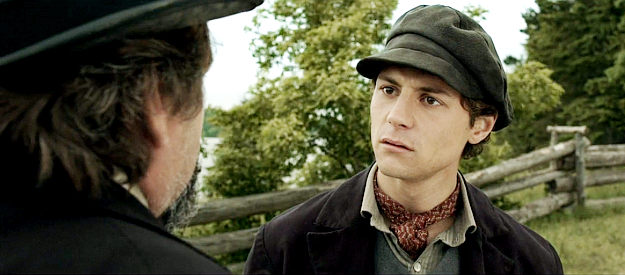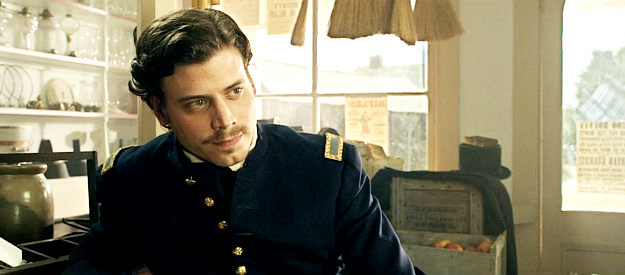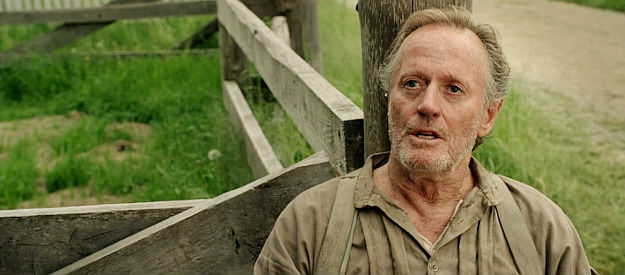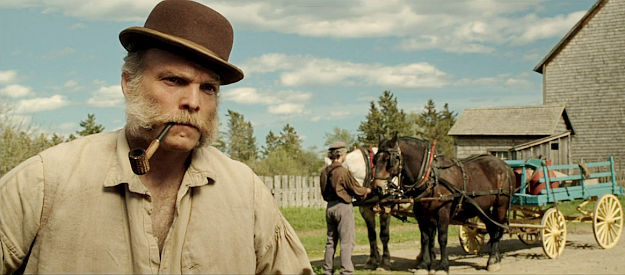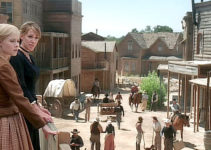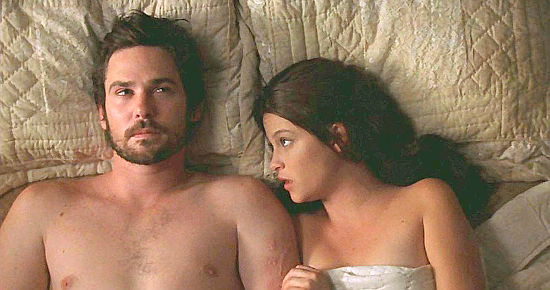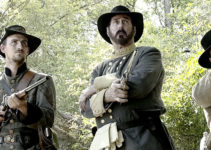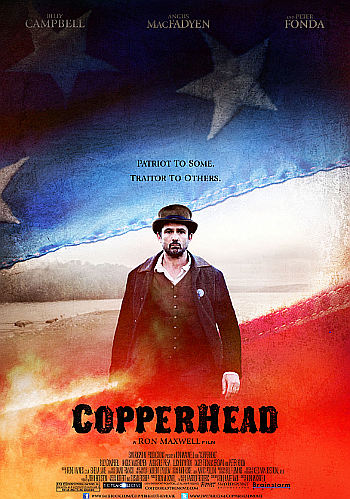 Billy Campbell is Abner Beech, a farmer in upper New York State with staunchly anti-war views in the early days of the Civil War.
Billy Campbell is Abner Beech, a farmer in upper New York State with staunchly anti-war views in the early days of the Civil War.
He believes in the Constitution. He believes in state’s rights. He doesn’t believe it’s permissable to take up arms to force Southern states to live the way he’d prefer.
That puts him at odds with most residents in The Corners and certainly with Jee Hagaborn (Angus Macfadyen), a fiery abolitionist if ever there was one.
Trouble is already brewing when Hagadorn’s pretty school teacher daughter Esther (Lucy Boynton) catches the eye of Abner’s somewhat rebellious son Jeff (Casey Thomas Brown).
Both fathers object to the relationship. The relationship blossoms nevertheless. And Esther’s viewpoints on the evils of slavery begin to rub off on Jeff.
Finally, he decides to march off and join the Union Army. Abner Beech feels so betrayed by the news, he and his wife don’t even show up for his send-off.
Then comes the battle of Antietam and news that Jeff is missing in action.
And as war casualties mount, the other residents of The Corners become less and less tolerant of the Copperheads living among them.
Finally, they decide to go on their own march: To make a visit to Abner Beech’s home.
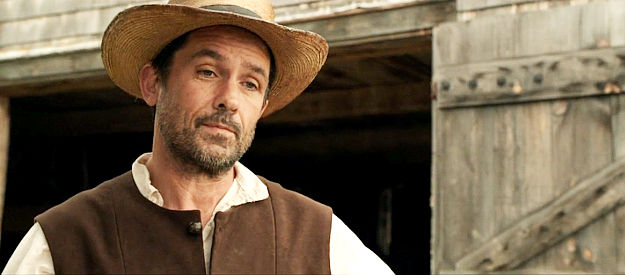
Billy Campbell as Abner Beech, a man who finds himself shunned by neighbors because of his anti-war views in Copperhead (2013)
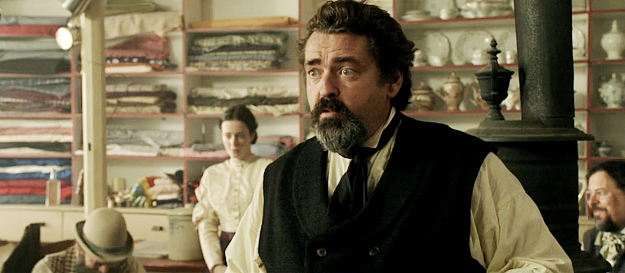
Angus Macfayden as Jee Hagadorn, expressing his pro-war viewpoint in the general store in Copperhead (2013)
The first film in 10 years from director Ron Maxwell, who brought us the impressive “Gettysburg” (1993) and the far less impressive “Gods and Generals” (2003).
What stood out about both of those films were the epic-scale action scenes as he recreated major battles of the Civil War.
Don’t expect anything along those lines here. Barely a gunshot is fired over the course of the two hours.
What we do get is a pretty well done, character-driven drama featuring fine performances from Abner Beech as the copperhead and Lucy Boynton and Casey Thomas Brown as the young lovers.
The drawbacks: Angus Macfadyen is way too over the top as the abolitionist father of Esther (he says it would kill him is she married Jeff) and Ni (whose reluctance to join the fight shames his father).
Peter Fonda’s role is one of the guest star variety. One of the better ideas is Esther’s reluctance to call her beau by his given name because it reminds her of Jefferson Davis.
Young Jeff is so smitten, he agrees to go by his middle name — Thomas — from that point forward.
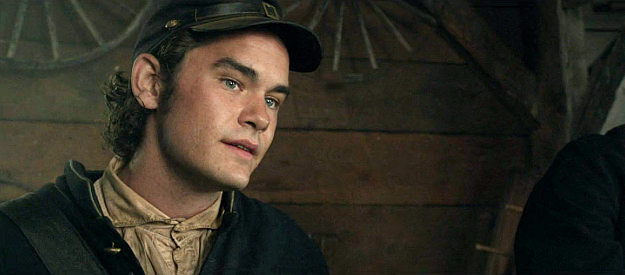
Casey Thomas Brown as Jefferson Thomas Beech, who marches off to fight over his dad’s objections in Copperhead (2013)
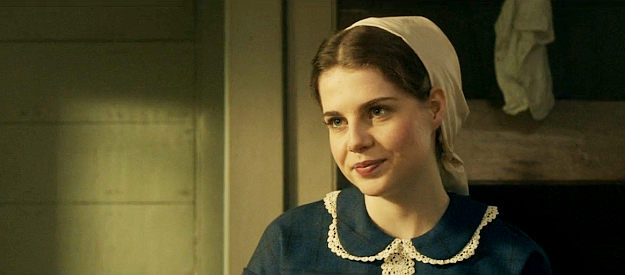
Lucy Boynton as Esther Hagadorn, assuring her father she has no immediate plans to marry in Copperhead (2013)
Directed by:
Ron Maxwell
Cast:
Billy Campbell … Abner Beech
Angus Macfadyen … Jee Hagadorn
Augustus Prew … Ni Hagadorn
Lucy Boynton … Esther Hagadorn
Francois Arnaud … Warner Pitts
Casey Thomas Brown … Jeff Beech
Peter Fonda … Avery
Genevieve Steele … M’Rye Beech
Hugh Thompson … Hurley
Josh Cruddas …. Jimmy
Mary Fay Coady … Janet Wilcox
Andrea Lee Norwood … Till Babcock
Runtime: 120 min.
Memorable lines:
Jeff Beech: “Name ain’t Jeff no more. Name’s Tom. Jeff is Jeff Davis. I don’t want no traitor name.”
Abner Beech: “You’re named after Thomas Jefferson, you idiot. Is he a traitor?”
Jeff Beech: “No. He’s a slaver though.”
Abner: “He wrote the Declaration of Independence, you fool.”
Jeff: “I don’t imagine his slaves was too independent.”
Avery: “The Union, Abner. Doesn’t the union mean anything to you?”
Abner Beech: “It means something. It means more than something. But it doesn’t mean everything. My family means more to me. My farm. New York State means more to me. And you, Avery. Even though we may disagree. You mean more to me.”
Abner Beech, leaving church as the pastor launches into a fiery sermon: “Blessed are the peacemakers. Is that still in the Bible?”
Jimmy: “I just came to see if you’d heard any news.”
Esther: “About Tom?”
Jimmy: “About Jeff.”
Esther: “No. All we know is the brigade his regiment was in lost 141 killed, 560 wounded and 38 missing. That’s all. That’s all.”
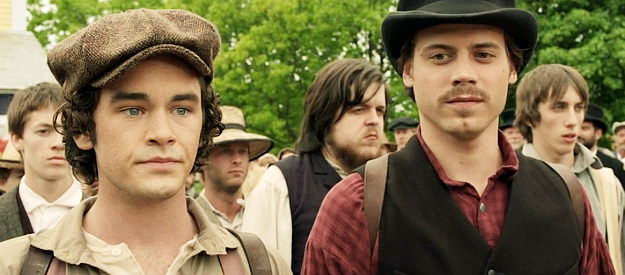
Casey Thomas Brown as Jeff Beech and Francois Arnaud as Warner Pitts march off to join the Union Army in Copperhead (2013)
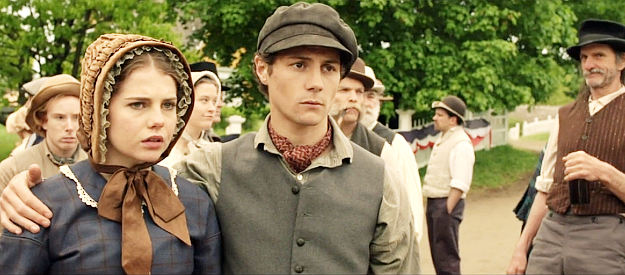
Lucy Boynton as Esther Hagadorn and Augustus Prew as her brother Ni (Augustus Prew) watch Jeff and his friends march off to war in Copperhead (2013)
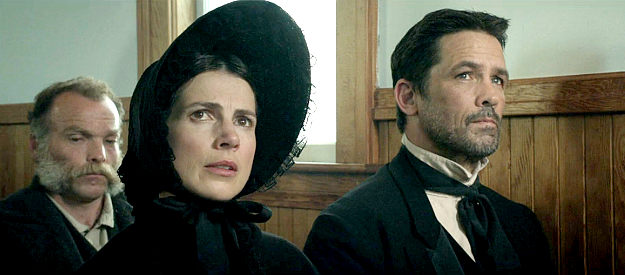
Genevieve Steele as M’Rye Beech with husband Abner (Billy Campbell), listening to an impassioned plea in church in Copperhead (2013)

